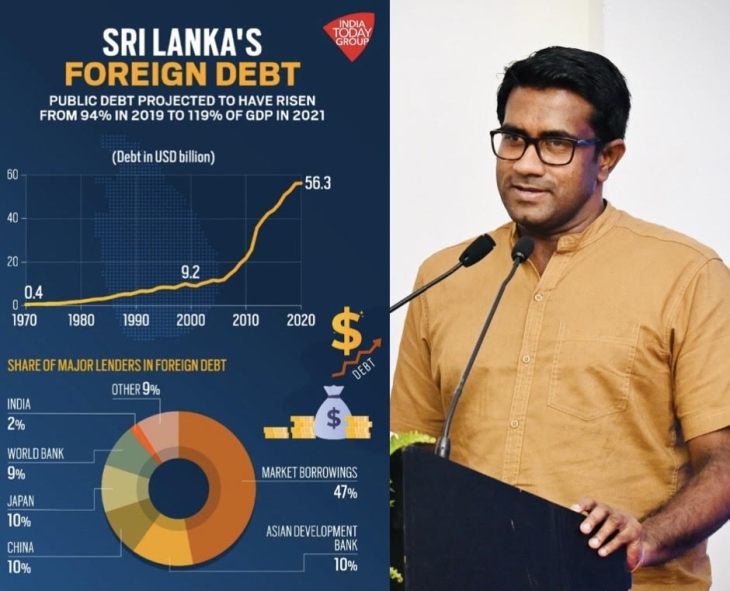LDM Convener Rasika Jayakody has presented a modality based on twin public commissions to uphold accountability in politics and revive the country's economy mired in crisis.
Addressing a gathering organized by the Rotary Club, Colombo, Jayakody has unveiled his proposal for the establishment of two public commissions — namely the Public Commission on Economic Revival and Transformation and the Public Commission on Accountable Governance — that will address a number of long-standing issues in the island nation's political and economic decision-making.
"The countless blunders that we have made over the past 75 years can be attributed to those three core issues," Jayakody said in his speech.
"Firstly, we let “popular politics” override rational economic decision-making. Secondly, we opted short-term gains over long-term losses. Thirdly, we politicized every aspect of the country’s governance, and we did not create a system to hold our politicians accountable," he said.
Public Commission on Economic Revival
He said, "One important pillar in addressing these issues is setting up of a Public Commission on Economic Revival and Transformation.
The proposed independent commission, established under an Act of Parliament, will ensure that economic decision-making is not unduly affected by ‘popular politics’.
The primary objective of this Commission is to address the immediate and long-term economic issues of the country in the spirit of reviving the economy to transform Sri Lanka into a stable and strong economy in the region. The role of the proposed Commission is to:
•Act as an independent body that is able to communicate between the voice of the people and the legislature and vice versa. The communication tools should include opinions obtained using technology to ensure the reach is far and wide.
•Analyze and make known the implications (negative or positive) of policy decisions to the Government
•Play a role in educating the people on policy direction and the logic behind such decisions.
The activities of the proposed Commission include:
1.Formulating and recommending economic policies to be considered and adopted as national policies;
2.Assisting the Government and the President to implement these policies;
3.Engaging services of experts from various fields to assist the Government to navigate through complex economic issues;
4.Proposing laws which will address economic issues;
5.Assisting the Government and the President with regard to any restructuring of SOEs, and providing the required services of persons who have the experience and knowledge in such programs, if so required;
6.Track the implementation and execution of government policy as well as monitor effectiveness and give input for required course correction
An independent Commission of this nature will (a) Build the confidence of the public in the Government; (b) Give credibility to the decisions of the Government; (c) will give confidence to the international community and other agencies with regard to the efforts of the Country to engage the participation of the public in addressing economic issues;
In his speech, Jayakody said he was not in favour of introducing minimum educational qualifications for elected representatives of the public as it will violate the basic tenets of representative democracy. "Parliament should not be a place exclusively reserved for the elite. Every single segment of society must be represented in Parliament in a strong and vibrant democracy. This includes trade union leaders, leaders from the farming community, representatives from marginalized groups, underrepresented communities and many more. Parliament belongs to all of them. Having said that, we must find our own mechanism to utilize the best human capital available in the country for economic decision-making, without undue political interference. We believe that a Public Commission of Economic Revival will cater to this need, at least to some degree," he pointed out.
Public Commission on Accountable Governance
Jayakody has also proposed another Public Commission to hold elected representatives accountable at all levels of governance.
He added, "While there must be a mechanism to draw best human capital for economic decision making, there must be a parallel mechanism to hold politicians accountable for their actions.
This is why we propose another Public Commission to assess the suitability of politicians based on a certain criteria such as their asset declarations, criminal convictions, the activities done in their electorates, and their commitment to good governance.
This Commission can form a Trust and appoint the incumbent Public Trustee, as the Custodian Trustee. Now what happens is that those running for public office, their spouses and dependent children will become a part of this Trust, by irrevocably pledging or vesting any property, wealth, and beneficial interests, which had not been included in their Assets and Liabilities Declarations made to the Commission.
Accordingly, any such property vests in the Trust will be in the name of the Public Trustee and all such trust properties are for the exclusive benefit of the people of Sri Lanka.
The LDM Convener pointed out that a civil society initiative called ‘CAG’ – Citizens for Accountable Governance has already launched a similar initiative. They have formed a CAG Trust as the Public Trustee as the Custodian Trustee and politicians can voluntarily sign up for this. "Not surprisingly, we have hardly seen any volunteers!, " he said highlighting the need for setting this up as a Public Commission making it a mandatory law in Sri Lanka.










